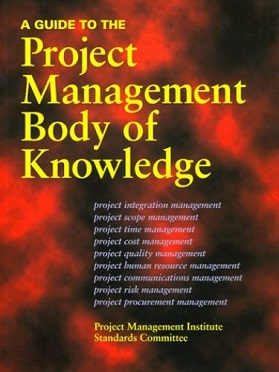Project management is the process of leading the work of a team to achieve all project goals within the given constraints. This information is usually described in project documentation, created at the beginning of the development process. The primary constraints are scope, time, and budget. The secondary challenge is to optimize the allocation of necessary inputs and apply them to meet pre-defined objectives.
The Software Engineering Body of Knowledge is an international standard ISO/IEC TR 19759:2005 specifying a guide to the generally accepted software engineering body of knowledge.

The Project Management Body of Knowledge (PMBOK) is a set of standard terminology and guidelines for project management. The body of knowledge evolves over time and is presented in A Guide to the Project Management Body of Knowledge, a book whose seventh edition was released in 2021. This document results from work overseen by the Project Management Institute (PMI), which offers the CAPM and PMP certifications.
In product development and process optimization, a requirement is a singular documented physical or functional need that a particular design, product or process aims to satisfy. It is commonly used in a formal sense in engineering design, including for example in systems engineering, software engineering, or enterprise engineering. It is a broad concept that could speak to any necessary function, attribute, capability, characteristic, or quality of a system for it to have value and utility to a customer, organization, internal user, or other stakeholder. Requirements can come with different levels of specificity; for example, a requirement specification or requirement "spec" refers to an explicit, highly objective/clear requirement to be satisfied by a material, design, product, or service.
The Project Management Institute is a U.S.-based not-for-profit professional organization for project management.
A responsibility assignment matrix (RAM), also known as RACI matrix or linear responsibility chart (LRC), describes the participation by various roles in completing tasks or deliverables for a project or business process. RACI is an acronym derived from the four key responsibilities most typically used: responsible, accountable, consulted, and informed. It is used for clarifying and defining roles and responsibilities in cross-functional or departmental projects and processes. There are a number of alternatives to the RACI model.

The Chartered Institute of Management Accountants (CIMA) is the global professional management accounting body based out of the UK. CIMA offers training and qualification in management accountancy and related subjects. It is focused on accountants working in the industry and provides ongoing support and training for members.

A business analyst (BA) is a person who processes, interprets and documents business processes, products, services and software through analysis of data. The role of a business analyst is to ensure business efficiency increases through their knowledge of both IT and business function.
Requirements management is the process of documenting, analyzing, tracing, prioritizing and agreeing on requirements and then controlling change and communicating to relevant stakeholders. It is a continuous process throughout a project. A requirement is a capability to which a project outcome should conform.
Business analysis is a professional discipline focussed on identifying business needs and determining solutions to business problems. Solutions may include a software-systems development component, process improvements, or organizational changes, and may involve extensive analysis, strategic planning and policy development. A person dedicated to carrying out these tasks within an organization is called a business analyst or BA.
A body of knowledge is the complete set of concepts, terms and activities that make up a professional domain, as defined by the relevant learned society or professional association. It is a type of knowledge representation by any knowledge organization. Several definitions of BOK have been developed, for example:
The International Institute of Business Analysis (IIBA) is a professional association formed in October 2003 with the stated goal of supporting and promoting the discipline of business analysis.
A glossary of terms relating to project management and consulting.
Macroscope is an integrated set of methods aimed at enterprise IT activities. Macroscope was developed and is maintained by Fujitsu in Canada. It is primarily used as their core body of knowledge to support the consulting services that they provide to their clients and is also licensed as a commercial product to a number of their clients
The following outline is provided as an overview of and topical guide to project management:
ISO 21500, Guidance on Project Management, is an international standard developed by the International Organization for Standardization, or ISO starting in 2007 and released in 2012. It was intended to provide generic guidance, explain core principles and what constitutes good practice in project management. The ISO technical committee dealing with project management, ISO/PC 236 was held by the American National Standards Institute (ANSI) which had approved four standards that used Project Management Institute (PMI) materials, one of which was ANSI/PMI 99-001-2008, A Guide to the Project Management Body of Knowledge - 4th Edition.
In business analysis, the Decision Model and Notation (DMN) is a standard published by the Object Management Group. It is a standard approach for describing and modeling repeatable decisions within organizations to ensure that decision models are interchangeable across organizations.
The Certification of Capability in Business Analysis (CCBA) designation is a professional certification from International Institute of Business Analysis (IIBA) for business analysis practitioners who want to be recognized for their expertise and skills by earning formal recognition.
The Systems Engineering Body of Knowledge (SEBoK), formally known as Guide to the Systems Engineering Body of Knowledge, is a wiki-based collection of key knowledge sources and references for systems engineering. The SEBoK is a curated wiki meaning that the content is managed by an editorial board, and updated on a regular basis. This wiki is a collaboration of three organizations: 1) International Council on Systems Engineering (INCOSE), 2) IEEE Systems Council, and 3) Stevens Institute of Technology. The most recent version (v.2.5) was released on October 15, 2021.
The Data Management Association (DAMA), formerly known as the Data Administration Management Association, is a global not-for-profit organization which aims to advance concepts and practices about information management and data management. It describes itself as vendor-independent, all-volunteer organization, and has a membership consisting of technical and business professionals. Its international branch is called DAMA International, and DAMA also has various continental and national branches around the world.


